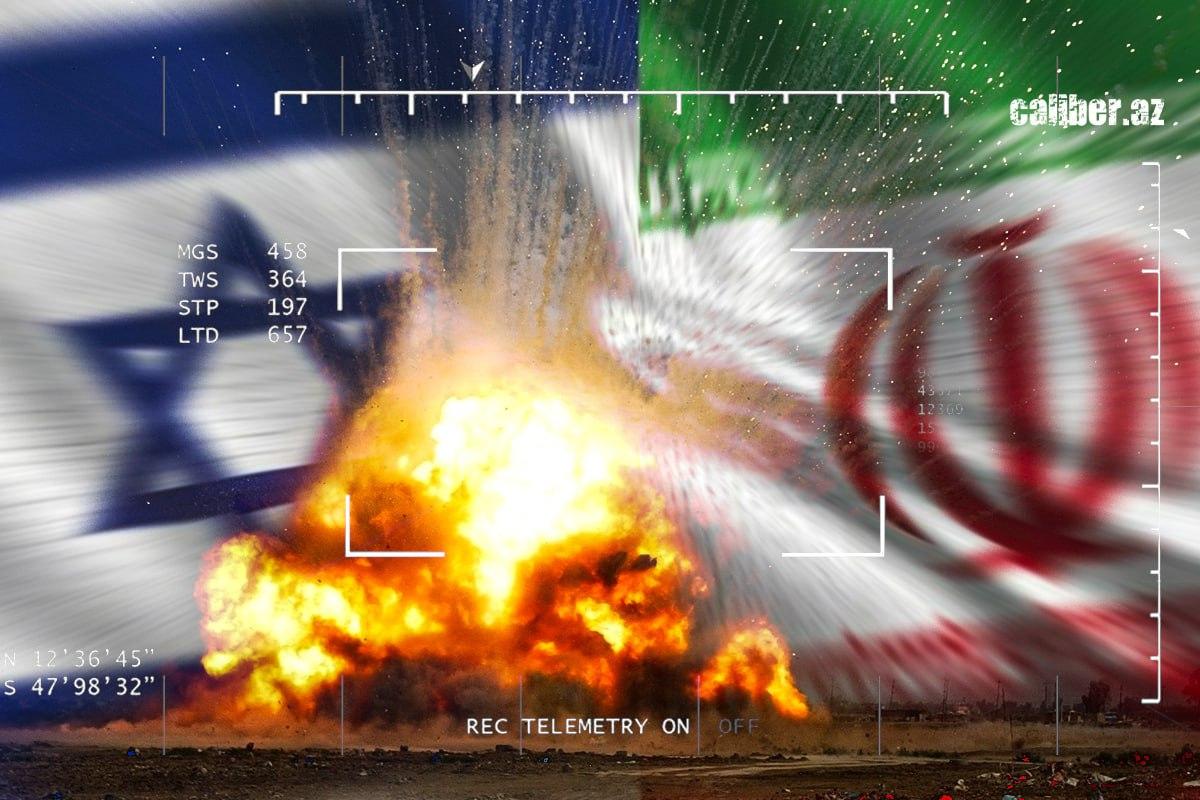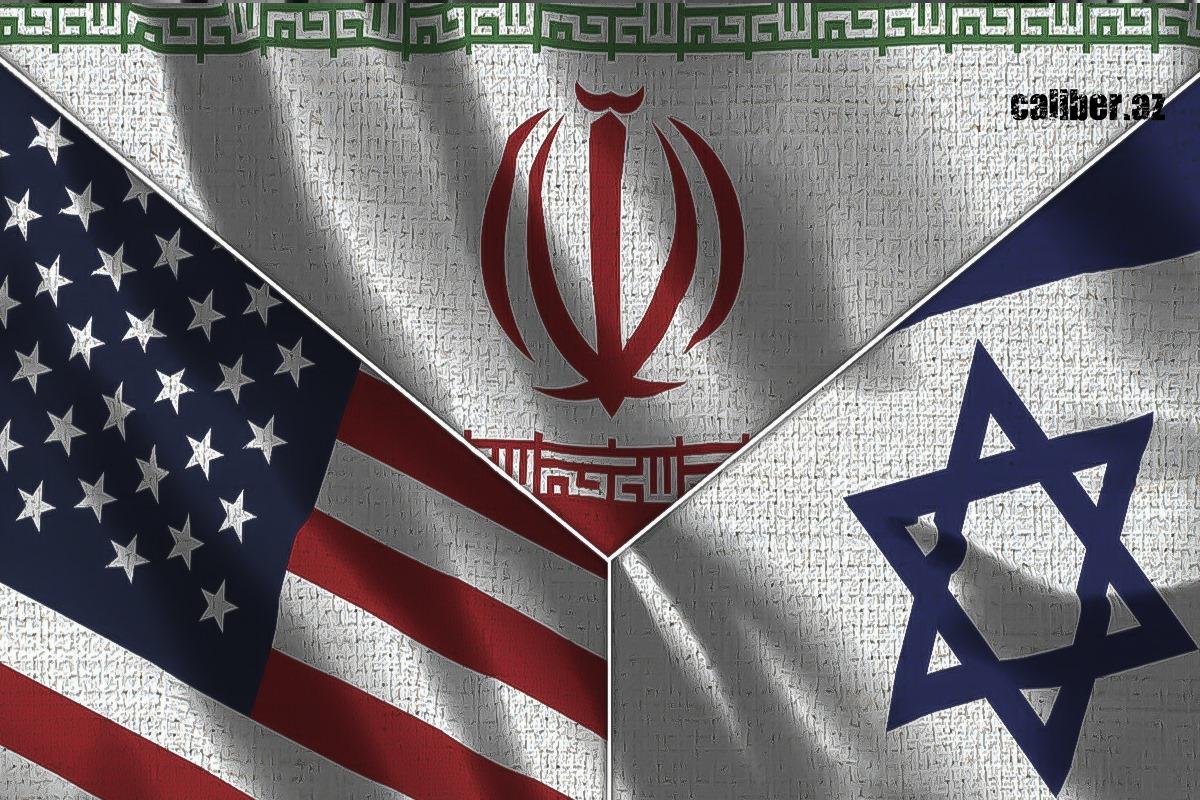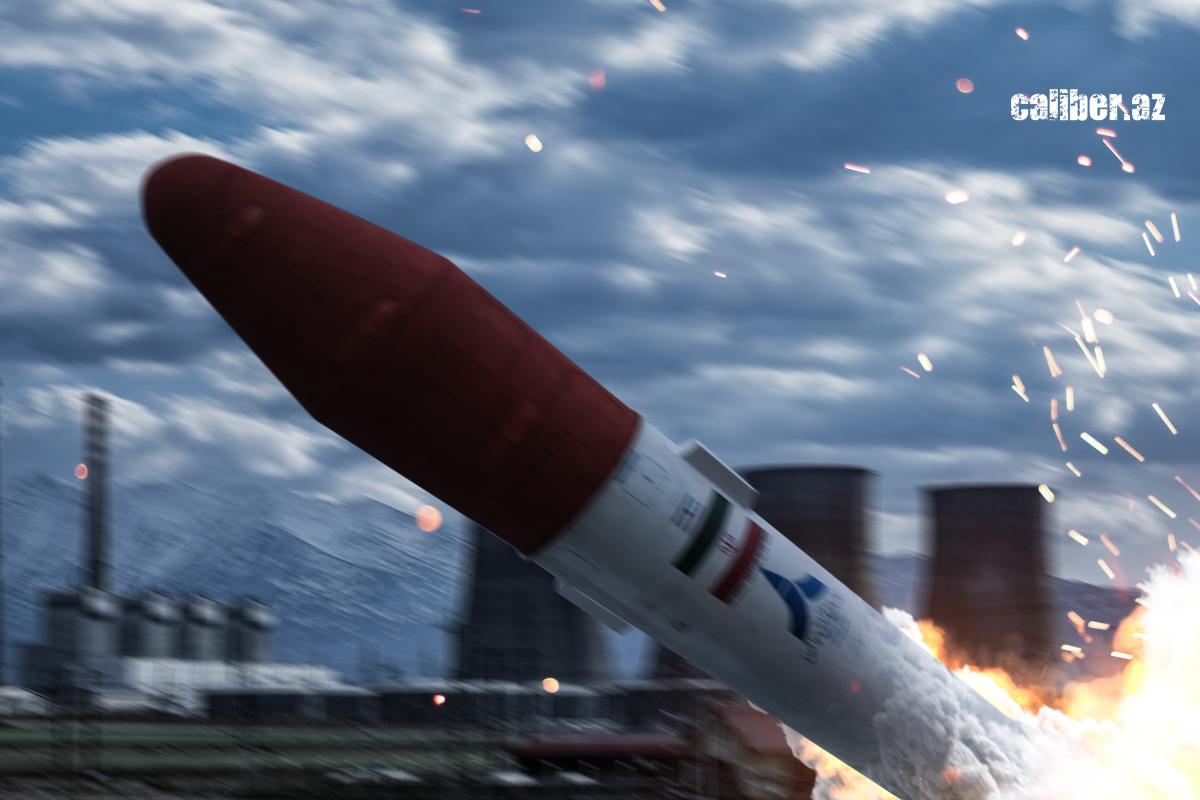Long-term consequences of exchange of blows between Israel, Iran
political analyst's opinion
ANALYTICS 01 May 2024 - 11:25
| Mikhail Shereshevskiy Caliber.Az |
Iran's recent strategy is to expand its influence in the Middle East through proxies.
Even during the Iran-Iraq war, when such powers as the USSR, the US and France began to support Iraq, Tehran realized that direct military expansion was impossible, because it simply would not be allowed to do so. The decision was made to abandon direct influence on neighbours and expand the influence, relying on Shiite (and other) political parties and armed militias.
Over time, the strategy was effective. Iran’s influence covers Iraq, Syria and Lebanon, which turned into a corridor to the Mediterranean Sea. Moreover, the pro-Iranian Houthis control a third part of Yemen, including the capital, Sanaa.
Israeli analyst, Major General Yaakov Amidror said that the Iranian strategy for conquering the Middle East consists of two elements.
The first element is the expansion of Iranian influence and the encirclement of Israel by forces allied with the Islamic Revolutionary Guard Corps (IRGC). The IRGC is the second army, including the most religious soldiers and officers, the security forces that suppress protests within the country, and Iran's leading economic corporation, controlling about half of its economy.
Another function of the IRGC, which is the core of the Iranian military-political and economic system, is external operations, cooperation with proxies, provision of these formations with weapons, money and ideology, as well as leadership over them. Amidror calls this tactic "creating a ring of fire around Israel". Lebanese Hezbollah, Syrian and Iraqi militias, Hamas in Gaza and the West Bank belong to Iran.
The proxies are simultaneously attacking the US military bases in the region and testing Israel's strength. The essence of Iran's strategy is to use plausible deniability and remain aside without being threatened while displacing the US and Israeli influence in the region. However, there are elite formations of the IRGC - the Quds Force in all these regions.
The second element of the Iranian strategy is the development of a nuclear and missile programme, which makes it possible over time to create the filling for a nuclear device and a carrier by receiving nuclear weapons. This way, Iran is raising the stakes and increasing the risks associated with a possible attack on it, seeking more security for itself. However, until now it has preferred to remain a threshold state, willing to create nuclear weapons, but not producing them. Iran waited till there was hope of exchanging the refusal of the last step - the production of nuclear weapons for the lifting of sanctions.

Amidror points to Israel's counter-strategy of targeting Iran-linked targets to force Tehran to pay a high price for its expansion. Israel's goal was to draw its red lines, indicating that the IRGC would suffer big losses, and they would increase as far as they approached the Israeli borders. Israel has been waging a “War Between Wars” campaign for several years, striking Syria, literally burning out Iranian military infrastructure there.
One of these attacks was the April 1 missile attack on the Iranian consulate in Damascus. Seven Iranian soldiers, including General Mohammad Reza Zahedi, who commanded Iranian forces in Syria and Lebanon, were killed there. After this, Iran decided to respond and directly attacked the Israeli territory, firing over 300 drones, cruise and ballistic missiles. Why did the country's leadership begin to directly exchange blows?
The consulate is officially part of the territory of the state. If the Israelis are allowed to attack Iranian territory and kill senior IRGC military personnel, essentially the masters of Iran and its neighbouring countries, then their next step will be to bomb Tehran. They will continue to move the red lines. That is, no matter what Iran does, it has already come under direct attack. The exchange of direct strikes began at Israel's initiative, and it was impossible to evade it. Evasion would testify to weakness and would escalate the situation with Israeli strikes.
The Iranian attack did not cause much damage to Israel, and almost all the missiles and drones were intercepted. An Israeli retaliatory strike could be devastating and could destroy Iranian nuclear facilities. However, Israel just fired one or two missiles at the city of Isfahan, where it destroyed an air defence radar. The precise strike showed scientific and technical superiority, but that was all. The US administration, which aims to prevent escalation in an election year, has threatened Israeli Prime Minister Benjamin Netanyahu with sanctions (most likely it threatened to stop supplying ammunition, which would paralyze the Israeli army).

So, Israel and Iran refused to further exchange direct strikes. What do both countries intend to do now? What is the balance of power?
Iran's weakness may push it to create nuclear weapons
As for Iran, Ali Alfoneh, Iranian researcher and senior fellow at the Arab Gulf States Institute in Washington, thinks that as a result of an exchange of strikes, nuclear Iran could emerge.
The expert said that the exchange of direct strikes showed Iran’s relative weakness. While most Iranian drones, ballistic and cruise missiles were intercepted by Israel's multi-layered air defence system, as well as the US, Jordanian and Saudi Arabian militaries, Israeli missiles managed to easily penetrate Iranian airspace, successfully hitting a radar installation in Isfahan, the central province of Iran.
The most important nuclear facilities are located there, which demonstrated their vulnerability. The Israeli missiles (perhaps 1-3) were not shot down, while Iranian missile interceptions over Israel and its neighboring countries were 90 per cent and even more.
Such a serious superiority in the enemy’s military technologies should force Tehran to take retaliatory steps by adjusting its strategy.
Moreover, Israel made only one precise strike because the Americans stopped it. What will happen if, for one reason or another, the US does not want to stop Israel - for example, amid the US-Iranian escalation or because any post-election administration will feel more free to make decisions?
Hezbollah, the pro-Iranian group that controls Lebanon, may have more missiles and drones in Lebanon. This may be done to shorten the flight time of missiles and reduce the likelihood that they will be shot down.
However, the main answer is the creation of nuclear weapons. Iran's hopes that it would be possible to resume the nuclear deal with the US (refusal from the creation of nuclear weapons in exchange for the lifting of sanctions on the Iranian economy) are futile, and the threat of attacks from the enemy has increased.
Ali Alfoneh thinks that as a result of the current situation, factions within the regime, standing for a change in the strategy regarding nuclear weapons, may become stronger.
“According to the fatwa of the leader of the revolution, the creation of a nuclear bomb is prohibited for religious reasons. However, if his opinion and fatwa change, we will be able to create a nuclear bomb,” scholar and specialist in nuclear physics Mahmoud Reza Aghamiri said.
Then General Ahmad Haktalab, who is in charge of the security of Iran's nuclear facilities, warned on April 18, saying that Iran would "review its nuclear doctrine and policy" if its nuclear facilities were attacked. He suggested that perhaps Iran would "deviate from previously stated positions" referring to Khamenei's fatwa against the development of nuclear weapons.
Such hints and statements are not accidental. Iran is sending a signal to opponents - be careful, we are closer to nuclear weapons than ever, and we may create them soon. This can become an example of a self-fulfilling prophecy - once such plans are announced, it becomes more difficult to avoid their implementation. Politicians are forced to answer for their words; threats must be backed up with actions from time to time, even if this does not always happen.
Israel - superiority strategy problems
Netanyahu is in a difficult situation. The basis of Israeli policy has always been preventive strikes at long distances, toughness, and rapidness. An important element of this strategy is the demonstration of superiority. Opponents pay a high price for any anti-Israel action - instant escalation, a blow to the heart. This strategy is used to stun the enemy and create a strong feeling that Israel is not worth messing with - it is too dangerous.

The second important element is raising the price directly for Iran to make it vulnerable, forcing it to pay more for getting closer to Israel. Therefore, the Iranian consulate was attacked on April 1. After Iran fired over 300 missiles and drones at Israel, the retaliatory strike was expected to be devastating. Adhering to the previous line - a strategy of superiority and escalation, Israel was supposed to attack Iran, using almost all its air force (over 400 combat aircraft), destroy Iranian air defence, nuclear and missile industries, and strike at decision-making centres and air force bases.
The strike was intended to resemble the attack at the beginning of the six-day war of 1967, when the Israeli Air Force destroyed 360 Egyptian aircraft on the ground during a few hours. After such strikes, Iran would have lost some ability to create nuclear weapons (although the most valuable elements of its nuclear programme are hidden underground), while Netanyahu would have entered Israeli history as a triumphant. However, nothing like this happened due to the US influence.
The usual scheme disappeared. Israel has lost the initiative. This weakened its position. How can it hit the Iranians in Syria? In return, Iran may launch numerous missiles and drones and this will drive the entire country into bomb shelters. The fact that almost the entire strikes were intercepted by air defence systems do not guarantee anything. One night when these systems were used cost Israel a billion dollars.
Moreover, according to the US experts, everything was on the brink. The attack turned out to be too powerful, and it was barely possible to liquidate it. Israel unable to make long-range, devastating strikes against the enemy became weaker and its strategy was disrupted. Perhaps the Israeli Air Force will make more attacks on Iranian proxies in neighbouring countries. However, the US administration will monitor them and limit them to prevent escalation.
The views and opinions expressed by the hired political analyst in their articles may differ from and do not always reflect the views of Caliber.Az.
Caliber.Az
|
1
|
Uncertainty over Russian border guard withdrawal from Armenia Amid conflicting statements
18 May 2024 - 14:47
|
|
2
|
Baku's 8-0 victory Diplomacy of sovereignty
20 May 2024 - 17:53
|
|
3
|
Türkiye, Greece forge new geopolitical axis Amid historical rapprochement
20 May 2024 - 16:04
|
|
4
|
Azerbaijani President warns against foreign interference in South Caucasus Emphasizes regional sovereignty
21 May 2024 - 12:56
|
|
5
|
Giant meteor seen lighting up skies of Portugal
19 May 2024 - 13:11
|
Sweden to replace Gripen-E with FFS fighter comparable to Su-75
21 May 2024 - 23:05
UK, Finland bolster Alliance to back Ukraine
21 May 2024 - 21:18
Armenian PM appoints new deputy head of Foreign Intelligence Service
21 May 2024 - 21:10
Russia starts exercise with tactical nuclear weapons
21 May 2024 - 21:05
Associated Press equipment seized by Israel for contravening Al Jazeera law
21 May 2024 - 20:55
Armenia, Ukraine discuss situation in South Caucasus
21 May 2024 - 20:42
UN calls Azerbaijan’s hosting COP29 important achievement for the country
21 May 2024 - 20:35
Azerbaijan, Türkiye focus on military cooperation prospects
PHOTO/VIDEO21 May 2024 - 20:27
Brussels hosts round table on Trans-Caspian Corridor potential
PHOTO21 May 2024 - 20:20
Azerbaijan emphasizes Middle Corridor's strategic role in green energy, technology transfer
21 May 2024 - 20:12
Baku hosts presentation of Latvia's cultural heritage in Azerbaijan
PHOTO21 May 2024 - 19:57
Canada announces additional sanctions against Russia
21 May 2024 - 19:42
Türkiye detains dozens of FETÖ members
Operation KISKAÇ-1621 May 2024 - 19:26
Israeli troops push into Jabalia, airstrikes kill five in Rafah
21 May 2024 - 19:26
Azerbaijan, Ukraine mull cooperation agenda, regional security
PHOTO21 May 2024 - 19:08
State agency: Azerbaijan bans 238 highly toxic substances to protect public health, environment
21 May 2024 - 18:57
Moldova, EU sign security cooperation agreement
21 May 2024 - 18:42
Minister: Azerbaijan, Uzbekistan plan joint works in Karabakh
21 May 2024 - 18:26
Azerbaijani President’s support for Turkish Cypriot rights hailed
21 May 2024 - 18:11
Macron's failures in Africa, New Caledonia, South Caucasus...
Neocolonial backlash21 May 2024 - 17:54
Bayraktar: Akıncı drone in Azerbaijan was ready to search for Iranian president's helicopter
21 May 2024 - 17:45
Parliament contemplates taxation of Armenian Apostolic Church
21 May 2024 - 17:40
Azerbaijani, Iranian FMs discuss deepening bilateral ties
21 May 2024 - 17:25
Türkiye - Greece rapprochement: Geopolitical implications, regional stability
Caliber.Az on YouTube21 May 2024 - 17:11
French MP’s absurd accusations against Azerbaijan draw ironic laughter
Hypocrisy and manipulation21 May 2024 - 17:04
Man killed in mine explosion in Azerbaijan's Tartar
21 May 2024 - 16:56
Azerbaijan, Uzbekistan strengthen ties with new cooperation agreements
21 May 2024 - 16:42
Russia favours comprehensive solution to space militarisation - Kremlin
21 May 2024 - 16:27
Physics vs. lyricism: Russia-China relations in a time of Western pressure
Is the alliance good or bad for Europe?21 May 2024 - 16:27
Azerbaijan’s economy minister invites Uzbek entrepreneurs to attend COP29
21 May 2024 - 16:13
China lodges protests with South Korea, Japan over Taiwan visit
21 May 2024 - 15:45
Armenian PM holds talks with CIA deputy director
21 May 2024 - 15:35
Houthi rebels claim they shot down another US drone
21 May 2024 - 15:30
Armenian speaker stresses importance of addressing entire border
21 May 2024 - 15:15
France to deploy more troops to troubled Pacific territory of New Caledonia
21 May 2024 - 14:59
Zelenskyy urges NATO to shoot down Russian missiles over Ukraine
21 May 2024 - 14:45
President Aliyev, Uzbek minister discuss economic and Investment cooperation
21 May 2024 - 14:22
EU unwilling to join US in trade war with China, says von der Leyen
21 May 2024 - 14:08
Netanyahu denounces bid to arrest him over Gaza war
21 May 2024 - 13:53
Armenian ruling party MP calls opposition claims on border delimitation ridiculous
21 May 2024 - 13:39
